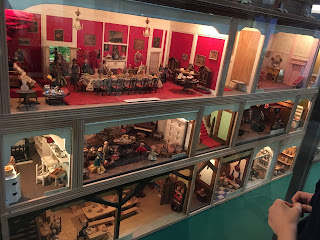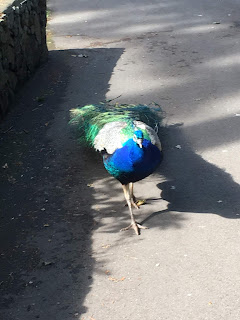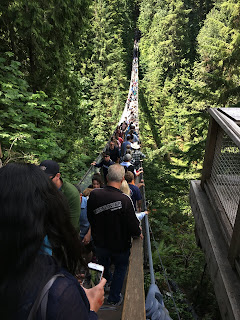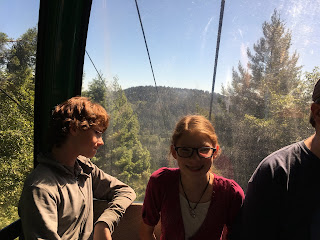Mark 6:30-44
Sometimes things seem overwhelming. Sometimes we become so used to relying on
other people that we don’t see the options until we are forced to be in a
leadership position. We don’t know our
strength and our gifts until they are called on. We sometimes take the easy way out and don’t
even see options unless we are the only ones who can.
I remember a time when my youngest child, Youngest was just a
baby of about 6 months old, Middle, my son was 2 and my eldest daughter was
5. I would not have been winning any
parenting awards on that day, and at one point I even considered shipping off
at least one of my lovely three children to someone who I knew would be much
better capable of managing what I came to think of as my own personal monkey
cage. I had to come expect help from my
husband on Fridays, but this particular Friday I was completely on my own all
day. The kids had been in rare form; all
demanding things in temper tantrum format all afternoon. By 7:00 I was a stressed out mess. With Youngest in a bouncy chair, and Eldest in
the shower, I was trying to get Middle dressed for bed. But when I tried to put his pajama top over
his head I was greeted with yet another temper tantrum. He would not tell me what he wanted, but
instead ripped the shirt off and started to scream at the top of his
lungs. At that moment, Eldest called me
to help her wash her hair and Youngest decided this was the perfect moment to
put in her two cents as well and she started crying like there was no
tomorrow. I explained to Middle that if
he was going to fight me I couldn’t help him, I left him in his room, went and
picked up Youngest who continued to scream, took her into the bathroom with me to
help Eldest with her hair and tried to take a deep breath. When Middle came running into the bathroom
after me, it was all I could do to not snap his head off with a “What is it
now?” But instead of crying, or screaming, my two year old boy walked up
to me, wrapped his arms around my legs and with a look of deep compassion said
very simply, “I’m sorry I was fighting with you, Mama.” In that moment I saw him again - my little,
caring, sweet boy who needed my attention, who needed my love. Yes, I could give it. I had reserves that I didn’t even know I had
just for him just for then.
Still, that was one day.
For the last 6 years, as you know, I’ve been the single mom of these
three children every day. And not only
do I manage to have the energy to do it, but I usually enjoy my time with my
kids and even manage to laugh and play with them regularly. I didn’t know I could. But we can often do more than we think we
can.
After I graduated from seminary, I interviewed with a church
in AZ to become their associate pastor. A
member of the nominating committee, as well as their senior pastor, came up to
meet me and spend some time with me to see if it would be a good fit. They were planning to spend the night at the
seminary and had made arrangements to do so, but when they got to their room,
they discovered that the door was locked and they could not get in. I think before this situation had arisen, I probably
would have been one of the people made helpless by this. “What are we going to do? The office is closed. There won’t be anyone there. It’s late at night. I can’t wake anyone up. What are we going to do?” But I was in the midst of an interview. And somehow I knew that this un-premeditated
test was going to either make or break the interview for me. So I took a breath and did some quick
thinking. I was house sitting at the
time at a home with no extra bedrooms.
But I thought of the student who I knew worked in the housing office and
who might be able to help us. This was
pre-cell phone days and I didn’t have his phone number, but I did know where he
lived. So we walked over to his house,
found he was not yet asleep and that he could help us, and together we were
able to settle the two men into their dorm rooms. I was offered the job. But more than that, I learned that day that I
could do more than I thought I could.
In the movie, “The Family Man,” the main character, Jack was
given the opportunity to see what his life would have been if he had chosen a
different path at a critical juncture. At
one point he met the man who in his real life worked under Jack and who, in
this glimpse of a life that might have been, was now the boss. What Jack found was that the same man, in
different positions, with different levels of authority, behaved very differently,
acted very differently, held himself differently. When he was the boss, he was powerful and
could make decisions and saw things clearly.
But when he was second in command, he was not capable of making
decisions, but deferred to Jack in everything, at times even whining with a
“what are we going to do?” kind of behavior of helplessness.
What are we capable of? What are we really made of? What can we do if we have to, if we are
forced to, if we must?
All of these situations remind me of the disciples response
to the situation described in today’s gospel lesson. The disciples don’t know what to do with all
these hungry people and they can’t seem to think on their own. They want Jesus to fix it. They want Jesus to send everyone away so they
won’t have to deal with them. But Jesus
challenges them to think and to take charge.
“No,” he says, “you feed them.” But
still, they don’t want to take on this leadership role, they don’t want to
think, they don’t want to use the gifts God has given them. So at that point they become whiney, “But we
only have 5 loaves and 2 fish!” they protest.
They choose not to think for themselves, or to act in this situation. I can just imagine Jesus giving a heavy sigh
of frustration as he takes the food from them.
He does his miracle. He shows
them a different way of being, one that involves trusting God to provide and
“acting as if” until the things that are needed become more than just something
to be hoped for, but actual realities.
He shows them that their faith is stronger than they can imagine, and
their abilities to rise to any occasion are deeper than they know.
But do they get it? Do
they then become the people God calls them to be, or do they just continue to
look to Jesus to always fix it for them and make things better and
stronger? They continue to rely on Jesus
until Jesus is finally gone. But they
have him as a model and when he does leave them, they finally do find their
strength and are able to continue to serve God and proclaim Jesus’ Good News to
all the people, despite personal danger, despite their human weaknesses.
We are called, like the disciples,
like all of God’s people, to be the best, most whole, most faithful and most
God-led people we can be. We are called
to feed God’s people and to heal God’s people and to tell the good news of
God’s love and grace. We are called to stand up for the poor, the oppressed,
the displaced: to stand up for them and make a better life for them. But we get
stuck in our “I can’t” thinking, and this is dangerous for all of us. It is also unfaithful.
Hildegaard de Bingen once said: “A
divine voice spoke to me, saying, ‘How fragile you are, Human, made of dust and
grime, but I am the living Light. I make
the darkness day, and I have chosen you to see great wonders, though I have
humbled you on earth. You are often
depressed and timid, and insecure.
Because you are conscientious, you feel guilty, and chronic physical pain
has thoroughly scarred you. But the deep
mysteries of God have saturated you, too, and so has humility.’ When I heard the Voice, I began trying to
live a godly life. The path became
difficult as I questioned myself again, saying, ‘This is pointless.’ I wanted to soar. I dreamed impossible dreams
and started projects I could never finish.
I became dejected, so I sat and did nothing. My
self-doubt is my greatest disobedience.
It makes me miserable, and I struggle with this cross daily. But God is by my side, reminding me that he
created me. So, even in the middle of my
depression, I walk with wise patience over the marrow and blood of my
body. I am the lion defending itself
from a snake, roaring and knocking it back into its hole. I will never let myself give in to the
devil's arrows.”
Marianne Williamson said it this
way, “Our deepest fear is not that we are inadequate. Our deepest fear is that
we are powerful beyond measure. It is our light, not our darkness that most
frightens us. We ask ourselves, ‘Who am I to be brilliant, gorgeous, talented,
and fabulous?’ Actually, who are you not to be? You are a child of God. Your
playing small does not serve the world. There's nothing enlightened about
shrinking so that other people won't feel insecure around you. We are all meant
to shine, as children do. We were born to make manifest the glory of God that
is within us. It's not just in some of us; it's in everyone and as we let our
own light shine, we unconsciously give others permission to do the same. As we
are liberated from our own fear, our presence automatically liberates others.”
God calls us to be whole, and to
serve out of the gifts we are given. Let
us strive to follow God to the fullest that we might be the most whole People
God calls us to be.
I want to end today by sharing with
you a prayer called the Knots prayer:
The Knots Prayer
Dear
God, please untie the knots that are in my mind,
My
heart and my life.
Remove
the have nots,
The
can nots and the do nots
That I
have in my mind.
Erase
the will nots,
May
nots,
Might
nots that may find
A home
in my heart.
Release
me from the could nots,
Would
nots and
Should
nots that obstruct my life.
And
most of all,
Dear
God,
I ask
that you remove from my mind,
My
heart and my life all of the “am nots”
That I
have allowed to hold me back,
Especially
the thought
That I
am not good enough.
Amen.















































































































